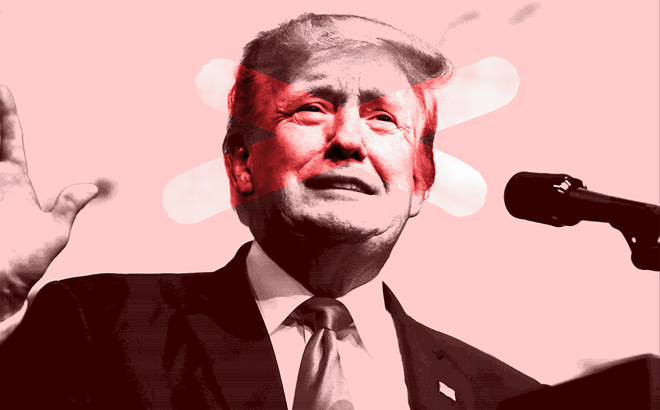
Photo by Gage Skidmore. Illustration by Jack Spatafora
The DOJ has never prosecuted a former president or presidential candidate, and Trump is both.
1. Which path will the GOP take?
The election should offer Republicans a clarifying moment. Donald Trump cost them the Senate and a sizable House majority. But he still commands the loyalty of a large chunk of the GOP base. Meanwhile, the likes of Marjorie Taylor-Greene will hold considerable sway in the Republican House caucus, as Kevin McCarthy capitulates to extremists in his bid for the speaker’s gavel (see no. 5).
2. Will Trump be charged?
The Department of Justice has appointed a special counsel to investigate Trump’s role in the Jan. 6 insurrection and his theft of classified documents after leaving the White House. Prosecutors in Georgia are probing his attempt to overturn the state’s 2020 election result. Prosecutors in New York are investigating potential fraud. The walls appear to be closing in.
But the DOJ has never prosecuted a former president or presidential candidate, and Trump is both.
3. Does the GOP’s DeSantis crush last?
The GOP is down on Trump for the same reason they’re up on Florida Gov. Ron DeSantis: They want to win. DeSantis, who culture-warred his way to a landslide re-election, looks like a winner. But it’s an open question whether DeSantis wears well on the national stage, or whether other Republican upstarts—Gov. Brian Kemp or Sen. Tim Scott, for example—steal his spotlight.
4. Will Joe Biden seek re-election?
If Biden runs, he’ll get the nomination, probably without a serious challenge. But the president is 80 years old. If he wins a second term, he’ll be 86 before it’s over. It’s not ageist to wonder if that’s a good idea.
If he doesn't run, the field is wide open: Kamala Harris, Pete Buttigieg, Gavin Newsome, maybe Raphael Warnock, too. And Gretchen Witmer has to merit consideration after her dominance in Michigan.
But Biden’s probably going to run. And if the economy’s growing, he’ll probably win. But six years is a long time for even a healthy octogenarian.
5. Will Kevin McCarthy be Speaker?
House Republicans have elected McCarthy as their leader, but actually becoming Speaker requires 218 votes, and there are several hardliners who say they won’t vote for him, no matter what.
If more than four stick to their guns, one of two things will happen: Republicans will find a unicorn who satisfies the far right and the caucus’ handful of moderates, or absolute chaos. The more likely scenario, however, is that McCarthy agrees to the far right’s demands, stripping himself of control and rendering the House ungovernable for the next two years.
6. Will Congress blow up the debt ceiling?
Next year, the House has to raise the debt ceiling. Failing to do so risks global financial calamity. Republican hardliners have already said they’ll hold the faith and credit of the United States hostage, using it as ransom to extract spending cuts and other concessions from the White House.
But without the Senate, Republicans lack leverage, and Biden appears to have learned that negotiating with hostage-takers encourages them to take more hostages. If McCarthy—or whoever is speaker—puts the debt ceiling on the floor for a vote, Democrats will ensure that it passes. But doing that might cost McCarthy his Speaker’s gavel.
7. Will the economy have a soft landing?
The risk inherent to the Federal Reserve’s counter-inflation effort is that it would freeze economic growth into a deep recession rather than cool it into a soft landing. The good news: The Fed has indicated that it will slow rate hikes in 2023, an indication that inflation is tapering. Still, there’s no guarantee that we won’t hit a recession this year.
Getting through this without one—or even with a mild, brief one—will bolster Democrats’ 2024 prospects. But if Congress defaults on the country’s debt, any hopes of avoiding a deep recession will vanish.
8. Will the Supreme Court eviscerate democracy?
In December, the court heard oral arguments in Harper v. Moore, in which North Carolina Republicans asked the right-wing justices to endorse a fringe legal theory that says that state courts can’t stop legislatures from gerrymandering congressional districts to partisan ends even if doing so violates the state constitution.
Further-reaching versions of this theory would allow legislatures to overrule voters and appoint the presidential electors of their choosing, ignore independent redistricting commissions, and disregard state court rulings on things like voter ID.
At least a few conservative justices seemed skeptical, but we won’t know for sure until
they rule this spring.
9. How desperate will Russia get?
To say the invasion of Ukraine has not gone to plan is an understatement. The bully got punched in the nose in front of the whole world.
But the bully still has nuclear weapons. In December, Putin mused about adding a nuclear first strike to his military strategy. The likelihood that Putin follows through on this threat seems low; he would be signing his own death warrant. But the risk isn’t zero, and the consequences are potentially world-changing.
10. What will happen to Elon Musk’s Twitter?
Before its acquisition last year, Twitter had grown into a hub for journalists, policymakers, academics, activists, and politicians to disseminate information. It was also a vile shithole of racist trolls and ad hominem attacks. But it was our vile shithole.
Billionaire edgelord Elon Musk made all of the bad stuff worse, and the useful stuff worse, too.
With the site becoming a higher-rent Gab, I wonder what gap it will leave in our national conversation—and what will emerge as the next information hub.

